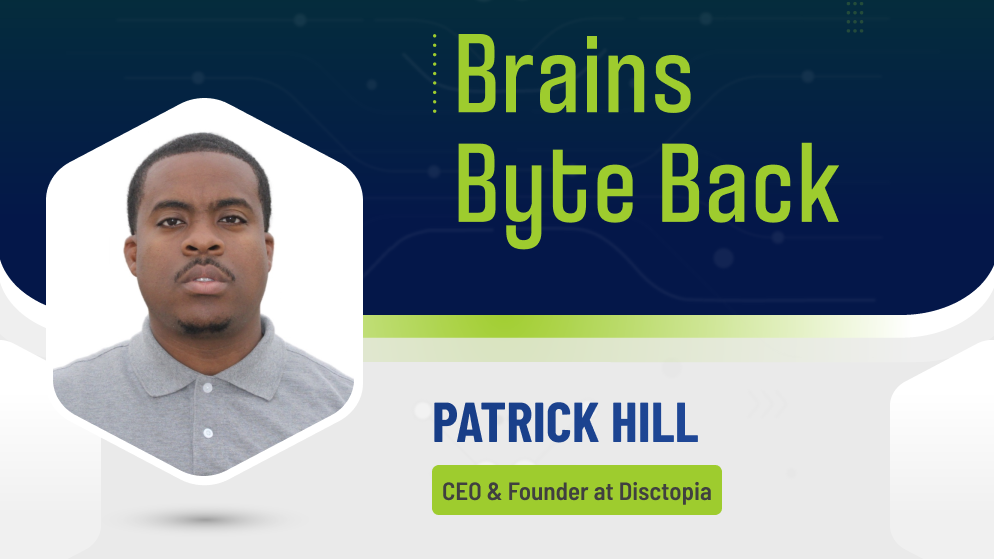In today’s episode of the podcast, we speak with Patrick Hill, CEO and founder at Disctopia, a podcast hosting & streaming service dedicated to artists, podcasters, film directors, & content creatives.
Hill starts us off by sharing how he founded Disctopia after his friend asked him to burn CDs for him. This set Hill on a path that would lead him to create Disctopia which focuses on empowering content owners with transparent data and fair payments.
Hill also talks about his history of selling mixtapes in high school. We discuss the transition from physical CDs to streaming and digital content, followed by the rapid shift in the music industry and the rise of streaming platforms.
Additionally, Hill talks about the play on words in the name “Disctopia” and how the concept of “freedom to distribute yourself” is encapsulated in the name.
Hill then goes on to highlight how Disctopia sets itself apart from the competition, stating the fair payment practices that help it shine compared to mainstream platforms like Spotify.
We also talk about predictions for the podcasting industry, with Hill advocating that audio as the future of communication. He believes that the expansion of podcasting will evolve beyond entertainment into various communication uses. And he also believes that we will see a rise in tracking engagement thanks to AI technology.
Finally, Hill shares his future plans for Disctopia. He advocates that the company will look to expand into other industries, and plans on carrying out innovations in the distribution of audio and video content. Along with an emphasis on providing more details engagement metrics to content owners.
You can listen to the episode below, or on Spotify, Anchor, Apple Podcasts, Breaker, Google Podcasts, Stitcher, Overcast, Listen Notes, PodBean, and Radio Public.
Alternatively, you can find a transcript below:
Patrick Hill: As you know, my name is Patrick Hill. I founded Disctopia. Ideally, I founded it approximately seven years ago in my head. It really started to get going about four years ago. If you subtract the pandemic, it was one year ago. But how we got started: a friend of mine knocked on my door. Long story short, he asked me to burn him some CDs so that he could sell them at the mall or wherever he was going to sell them. And I said, “No, I’m not going to do that,” but I ended up building him a website and putting a PayPal button up there, and he ended up making 250 bucks or something like that in an hour on Twitter and Facebook at the time.
Patrick Hill: And that’s when I had the idea of CD Disc Disctopia, the freedom to distribute yourself. Over time, we went from music to podcasts, and now we have all five mediums: Music, podcasts, audiobooks, film, and podcast videos. So that’s what we do. We help content owners not only distribute their content but also allow content owners to monetize their audience and the data we give them. Full transparency of their data, meaning, how many downloads you have. How many plays you have. How many streams you have, and we give you the actual numbers, not just the first 60 seconds or when someone clicks on it. We give you what we call true plays. And true plays are really important to content owners who are in the digital space.
Samuel Brake Guia: Fantastic. Thank you for joining me today. It’s great to have you here. And I do want to clarify something about your background because I was told you used to sell mixtapes from your backpack in busy crowds in Charlotte, is that true?
Patrick Hill: No, no. That was my friend. Yeah, no…
Samuel Brake Guia: That was your friend.
Samuel Brake Guia: Okay, okay, I got bad information then.
Patrick Hill: I actually used to sell mixtapes in high school.
Samuel Brake Guia: Okay, okay. You’ve got a long history in this.
Patrick Hill: Yeah, yeah. I used to actually, and I think it was at the tail end of BearShare when Napster got caught, but people were still online sharing music, and you had to go to this site called LiveMixtapes and Two Dope Boys, and you could actually download albums ahead of time. And you could download singles for promotional use. I used to mix them up on CD and sell them in high school. But the crazy thing about it is the second I graduated high school. the iPod happened. No one ever burned another CD like that. I don’t know. I feel like that day I graduated, the highest end of the day was like, “What’s a CD?”
Samuel Brake Guia: That is unfortunate. Yeah.
Patrick Hill: But that is how fast it flipped from CD to streaming, overnight. And honestly, that only happened about 15 years ago, but it feels like we’ve been streaming for decades, but we haven’t.
Samuel Brake Guia: That’s cool, and I really want to know the name Disctopia. That’s a really cool name. How did you come up with that?
Patrick Hill: Yeah. It’s really a combination of a compact disc, and since he asked me to burn a CD, that’s where we got that name from.
Samuel Brake Guia: That’s cool. I like that play on words, and I feel like there are a lot of streaming platforms and podcast-hosting companies out there. How do you folks really set yourselves apart from all of this competition?
Patrick Hill: It’s really not that many companies. It’s just a few big players. There’s some, what we call, OGs; they’ve just been in the game since the beginning, like Libsyn. I believe one of the first ones, Blubrry, and then you had some other ones like Podbean and Buzzsprout pop up. But with the big huge ones you’re talking about, iHeart, SiriusXM Radio, and Spotify. Those are the big ones, they control about 80 to 85% of the market. And then there are some other upcoming players like Acast. But how we set ourselves apart is that we are a platform for streaming; podcasting is just one of our mediums. Like I said, we have music, audiobooks, podcast videos, and we integrate that with commerce. So we give you more opportunities to make money.
Samuel Brake Guia: Fantastic. And I know in my mind, the one thing that stands out is how you help indie artists. I know that’s a big part of it all. Correct me if I’m wrong. I believe that’s a big part of your message. How does Disctopia help indie artists?
Patrick Hill: For one, we pay them. First and foremost, we pay you, and we pay weekly, and we pay you for true plays. So there’s no mixed signals, mixed confusion about what your content is worth, how much is being played, and we pay you for that playtime. So, that’s the biggest… The other thing is we’re a direct-to-consumer product. So, for instance, if you have content, you have a music album, yeah, a podcast, we give you the ability to go directly to your customer. A lot of musicians fall for the trick, “You gotta be on Spotify, you gotta be on this main big platform for you to make any money,” and that’s not true. We know a lot of independent artists who are still selling vinyl, still selling CDs, believe it or not. Some of them are doing free shows, and they’re selling merch, and they’re doing very well. We have the average person on our platform that sells both direct to the consumer and merch; they average around a hundred and fifty bucks a week, which then turns into $450 to $500 a month. And they always tell us, “Hey, I made 200, 300 bucks this week,” and I always ask myself, “How much did Spotify pay you this week?” Yeah. “I got $17.” And the streams on Spotify are way higher than the streams on Disctopia, but we just pay you fairly and we give you other opportunities. So, yeah, that’s the biggest difference.
Samuel Brake Guia: I think that sounds appealing. I think Spotify is quite famous for its mistreatment of artists in the sense that it just does not pay them what they deserve. So it’s really reassuring that there are companies out there like yourself that are standing up for these artists and giving them a really fair deal from the sounds of things and giving them the opportunity to make a living off their creativity.
Patrick Hill: Yeah, and in Spotify’s defense, they’re operating off an old model, and that’s the label model. Just how podcasting is operating off a per impression model? Which is the wrong model. Even with ads, podcasters are being paid somewhere between 19 and 21 CPM, which stands for cost per impression. I don’t know. I mean, you’re familiar with the old ad agency; cost per impression was really built off web pages. How many hits did my website get? But if you think about it, someone’s attention, longer than two minutes deserves way more than one dollar per thousand impressions. So it’s just that those two models are really archaic. Like I said, music is based on an old label model where the label gets paid first, takes this cut for studio time, and marketing time, then the writers get paid, and the performers get paid, which is an old model. So once they fix the business model, then hopefully things will happen, but it seems like they’ve had a lot of opportunities to fix the business model but haven’t decided to change it.
Samuel Brake Guia: Yeah, I suppose that gives a lot of opportunities to new companies like yourself, and hopefully this does evolve over time to bring more opportunities to those who are actually creating the content. And I’m kind of curious to know, what are your predictions for the overall podcasting industry over the next three years?
Patrick Hill: I have some bold predictions for podcasting in the next few years.
Samuel Brake Guia: Okay.
Patrick Hill: So, as you probably know or don’t know, we believe audio is the future of communication. I believe that we went from typewriters to… Well, we started with stone tablets, then we went to feathers and ink and feather pens. And then we went to typewriters, then we went to email, and now we’re in this era of quick video through social media. But I do believe audio is the future of all communication. Just as we don’t write in cursive anymore, we’re teaching kids to type, I believe that due to the advances in technology and AI, we will no longer type; we’ll just speak.
Patrick Hill: And audio is a big part of that. So, in the next three years, I see podcasting expanding tremendously outside of entertainment into everyday communication uses, from work to workplace training to development, to all sorts of communication going into the form of audio, somehow, some way, if not video. After that, it’s going to be fast and quick. It’s kind of like how the mail system went from the Pony Express to video calls. We don’t write letters anymore; it’s definitely a non-starter to write a love letter to someone unless you really love them. Someone writes a love letter…
Samuel Brake Guia: That’s special.
Patrick Hill: Especially if it’s original, but yeah.
Samuel Brake Guia: Yeah.
Patrick Hill: So if someone writes you a love letter, then you definitely want to keep hold of them. But other than that, audio is the future of communication, and podcasting is going to expand. Right now, it’s 90% entertainment. There are some business podcasts, and some news podcasts, but at the end of the day, news is still a form of entertainment. I’ve got to watch the news. I’ve got to go to CNN or NBC or whatever you watch for news. It’s still a form of entertainment. That is a branch of television. But I see podcasting going into other pockets and use cases for communication.
Samuel Brake Guia: What is next on the horizon for you folks?
Patrick Hill: Where we are growing fast. Next for us is really to get into engagement and the artificial intelligence of engagement and how to just make sure that we are tracking engagement at a true level and not just from the old-fashioned way of clicking play or if it was downloaded. So that’s our first step, to really track engagement. The next step is to give those engagement metrics fully to the owners of the content. So we’re heavily built into that. And last but not least, we plan to grow in other industries outside of entertainment. As you mentioned, there’s so much competition. Inside sports podcasts or political podcasts, which are all entertainment to us. But where is the innovation? We talked about it in Pod News a few months ago. Everyone gives you an RSS feed and social media integration, but where’s the innovation in podcasting? That’s where we want to come and play. We want to innovate in the audio and video space from a distribution point. So not only getting from point A to point B but being very innovative in that distribution or in that process to point B.
Samuel Brake Guia: I think that sounds super exciting. I can’t wait to see what innovation brings in podcasting, and I can’t wait to see what you folks contribute to this future of podcasting as well. And if people are listening and they’re thinking, I want to connect with Disctopia, keep up with the work that you folks are doing, or even use your services, what’s the best way for them to do that?
Patrick Hill: Always www.Disctopia.com or find us on social media. Just Disctopia like the D-I-S-C-T-O-P-I-A. If you just want to grab some time with me, definitely go online to Disctopia.com, fill out the form, and we can go through your plans of how you want to harness your audience data and get true play metrics.
Samuel Brake Guia: Excellent. Patrick, thank you so much for joining me today for this quick snippet into our future of podcasting and what you folks do and your background because it’s pretty cool, and I highly recommend listeners go check out Disctopia. We’ll have the links to that in the show notes.
Disclosure: This episode includes a client of an Espacio portfolio company












